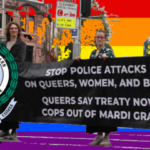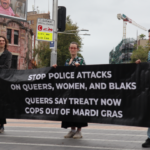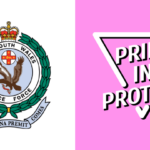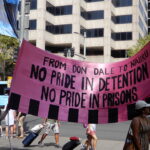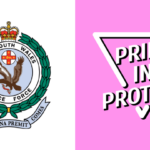Mardi Gras May Have Passed, But NSW Police Remains a Rogue Force
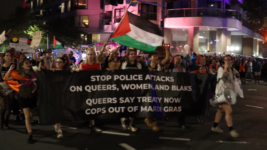
The city was in a tither last week, over the news that the Mardi Gras Board had requested that members of the NSW Police Force not march in the parade last Saturday night, to allow the community “space to grieve”, after an officer allegedly shot two gay men dead in Paddington.
Then senior constable Beau Lamarre-Condon is said to have had a fling with Jesse Baird and went on to stalk the one-time TV presenter, and, after having checked out his service pistol from Miranda police station over a number of days, the officer shot and killed Baird and his partner, Luke Davies.
But despite this request, the political establishment wouldn’t have it, and NSW premier Chris Minns and even the PM Anthony Albanese applied their authority to the matter, and a compromise saw LGBTIQA+ officers marching in dark navy blue plainclothes and flanked by armed riot squad officers.
Issues relating to NSW police run much deeper than the recent murders, however, as the law enforcement body, which is one of the largest in the English-speaking world, despite NSW not being overly populated, has long been charged with being steeping in racism and homophobia.
But the issues don’t stop there. NSW police excessive force and lethal force incidents are increasingly being questioned, as is the system that sees state law enforcement refusing to reform the way it operates in the field, but rather pay compensation when it faces claims of misconduct.
Keeping it on the agenda
“The heartbreaking alleged murder last week leaves many questions to answer from NSW police, which feed into well-known systemic issues about weapons practices and accountability,” said NSW Council for Civil Liberties immediate past president Josh Pallas in a 28 February statement.
The lawyer made the comment as part of a coalition of prominent NSW rights and legal groups formed to join the chorus supporting the Mardi Gras Board’s request that NSW police didn’t participate in the 2 March Mardi Gras parade, but also to call for “immediate reform”.
Pallas added that NSW police commissioner Karen Webb having called on her Victoria police counterpart to conduct a review of her force’s weapons policy is not good enough, as “any review… needs to be independent of both the NSW government and any police force”.
The coalition includes Redfern Legal Centre, National Justice Project, Inner City Legal Centre, Human Rights Law Centre and Community Legal Centres NSW. And they’re clear that three areas screaming for police reform are intimate partner violence, use of force and police investigating their own.
“For the public to have confidence in reporting mistreatment by police there must be an independent body to report to,” explained National Justice Project principal solicitor Emma Hearne, “so we can feel safe and have trust in the investigation and prosecution process.”
Issues at hand
In a 28 February letter addressed to the NSW premier, the police minister, the attorney general and the NSW police commissioner, the coalition pointed to the need to take intimate partner violence seriously when reports of it involve members of the LGBTIQA+ community.
According to reports on the alleged Lamarre killings, the officer is said to have stalked Baird after the pair had a brief fling, and the civilian then reported this persistent harassment to the NSW Police Force, which resulted in no action being taken and allowed matters to escalate in a deadly manner.
But criticism of NSW police handling of intimate partner, domestic and family violence is not confined to the queer community, as complaints are often made about police not taking such violence seriously, and, when it comes to one of their own, assisting in ensuring no action is taken.
The second issue that needs reforming is NSW police use of force, which is known to have a tendency of becoming excessive, and when it comes to the use of weapons, both guns and tasers, officer use of these can turn lethal.
Indeed, over the last 10 months, five civilians living in this state have all been killed by NSW police officers while having a mental health crisis after law enforcement had been called upon to provide assistance to, only to then kill the person in distress.
The community was outraged when senior constable Kristin White tasered 95-year-old Clare Nowland, on having been called out to assist her as she was having an episode, which involved her holding onto a steak knife in the nursing home, where she lived.
The great-grandmother moved towards the officer, holding the knife, while using a walking frame but, as she refused to stop after he’d called out to her, White tasered the elderly woman, which caused her to fall and subsequently die a week later in hospital.
The third matter that’s long been identified as needing reform is the system that sees police investigating police over critical incidents. This practice, these days, often sees charges laid against an offending officer, however punishing individuals doesn’t reform ongoing problematic conduct.
The state does have one police oversight body, the Law Enforcement Conduct Commission. However, while the LECC does investigate NSW police serious misconduct incidents, it only monitors critical ones and the body is known to have been underfunded since its inception in 2017.
The fee for a lack of reform
Then NSW MLC David Shoebridge revealed in 2020 that NSW police had paid out over $24 million in compensation over the 12 months of 2019/20, which was used to settle serious misconduct cases out of court and to pay to defend and compensate the 298 misconduct cases that went ahead.
As the now Australian senator explained at the time, the NSW Police Force had not been collating this information to identify recurring areas where serious misconduct is occurring, which could allow for persistent issues to be addressed in training.
NSW Greens MLC Sue Higginson began calling on the Minns government to conduct an inquiry into NSW police use of force and weapons after the death of Nowland last year, whilst the National Justice Project put out a call for a Royal Commission into all Australian police after the fourth death.
“It’s not just the culture of our police that is in question,” explained NJP CEO George Newhouse and founder Duncan Fine in an article calling for the national inquiry.
“All state governments, cheered on by the usual suspects of raucous conservative elements in the media, are responsible for this situation, with their predictable and cynical ‘tough on crime’ campaigns.”


